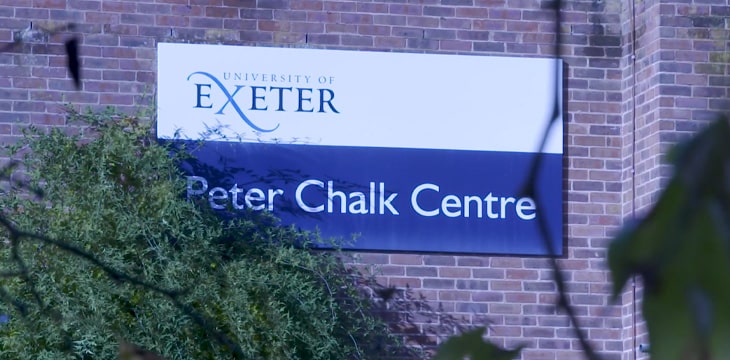|
Getting your Trinity Audio player ready...
|
The University of Exeter has become a center for blockchain technology education, all thanks to the forward-thinking initiatives of Professor Jack Rogers, the University’s MSc FinTech Programme Director.
When asked why he’s so excited about blockchain technology—BSV blockchain in particular—Rogers told me it is about “thinking about continuing the original vision for Bitcoin as envisioned by Satoshi and getting as many people together globally to make it happen in a way that is easier for more people to understand.”
And this is exactly what Rogers had in mind when he organized the IEEE Exeter Blockchain Event on November 3 and 4 in partnership with Latif Ladid, IPv6 Forum President.
Taking place at the University’s Peter Chalk Center right in the middle of campus, the event consisted of one and a half days of both virtual and in-person sessions and a half day dedicated to a Bitcoin white paper line-by-line.
“We’ve had a whole range of different talks from different people. We’re talking about people building applications on Bitcoin SV who have been sharing their experiences alongside education initiatives like Kashif from Nigeria. We’ve also had a cybersecurity expert here in Exeter,” Rogers said.
“The idea of all of this really is just to get people talking from different communities, perspectives and research kind of environments. I like to think it’s been quite a unique event really, and we want to continue doing this,” he added.
nChain, a leader in the BSV blockchain research and product development space, unsurprisingly had a big presence at the event, with their Director of Research Owen Vaughan there as a speaker and resource for students in attendance.
“It’s a very interesting event that’s drawn people from across the world. We’ve had people from Africa, from Australia, all over Europe, and we really wanted to have a diverse range of topics,” he said.
“We’ve ranged from economics to central bank digital currencies through to security, zero knowledge proofs and IPv6. So it’s very exciting to have all those ranges of topics in one place and share ideas,” Vaughan added.
While the sessions covered a wide range of topics, one of the main purposes of the event was to educate the students on IPv6. Dr. Craig Wright, Chief Scientist of nChain, also a key speaker at the event, explained exactly what IPv6 is from his point of view.
“It’s part of the overarching structure of what Bitcoin will be involved with, which is pushing everything to the edge,” Dr. Wright explained.
“Edge computing changes things from the cloud to more of a fog where we have lots of little end points and individuals able to directly communicate with each other,” he added.
Stefan Nilsson, founder and CEO of UNISOT, was also a speaker at the event and elaborated on the relationship between IPv6 and blockchain, in particular how the marriage will benefit food supply chain.
“We have too few IP addresses in the world so we have to jump through hoops and do different magic tricks to try to make Internet work in a good way. That creates a lot of security problems and scalability problems,” he explained.
“But by implementing IPv6 together with blockchain, we are solving a lot of these problems meaning that companies can communicate very securely with each other,” he said.
“That’s what we are looking into now to implement in our food supply chain systems, to make them more fun and more efficient and more secure,” Nilsson added.
In fact, the marriage of IPv6 and blockchain is a major research program for nChain and according to Vaughan, he and the research team are looking at how both technologies can benefit from one another.
One area they are looking into is how IPv6 can help make Bitcoin payments secure, private, scalable and on a more local basis. They are also taking inspiration from IPv6 for Bitcoin address management in terms of wallet design.
Vaughan also emphasized how the protocols of IPv6 and Bitcoin (BSV) are set in stone. IPv6’s protocol was proposed in 1998 and is still using the same protocol today while Bitcoin’s was set in 2009 and is still being used today (in the form of BSV).
“[BSV’s] power is in its fixed protocol and hopefully will get to the type of adoption that IPV6 has got to as well,” Vaughan said.
“The link between the two is cryptographically generated addresses. This is something else we’re touching on at the moment in nChain research, and that concretely links the Internet protocol with the blockchain protocol. And that’s particularly exciting,” he said.
The event’s program also included a line-by-line run-through of the Bitcoin white paper with Brendan Lee, founder of Elas, to help students understand exactly how IPv6 fits in with Bitcoin as it was created.
“We’re really doing [the line-by-line] because I think that probably the Bitcoin white paper is one of the most misunderstood documents of the last couple of decades,” Lee pointed out.
“The goal this afternoon will be to give the students here at Exeter a much clearer understanding of how that system works and really why it’s designed the way it’s designed,” Lee said.
“What we’re trying to do is to help them to understand it in a way that will allow them to build things that empower people who can really improve the systems or create all new systems that are ten times better than the ones that we use today,” he added.
Looking back on our experience at Exeter, it was such a pleasant and informative experience due to the teamwork of Rogers and Ladid. The pair succeeded in bringing together the best speakers in a room full of engaged students, leaving the door wide open for more events like this to follow.
“In every university you have always one guy who is totally different and he’s engaging new research and so forth. So [Professor Rogers], I think, one of the first professors that is doing this, and it was very charming for me to get to know him six months ago,” Ladid shared.
“So we decided to do this event and then mix some IPv6 and some blockchain people to create that merger, to make these things happen. It’s highly successful. I think the University of Exeter will be a centre of blockchain in the future,” Ladid added.
Watch: IEEE Future Networks World Forum highlights

 02-16-2026
02-16-2026 




